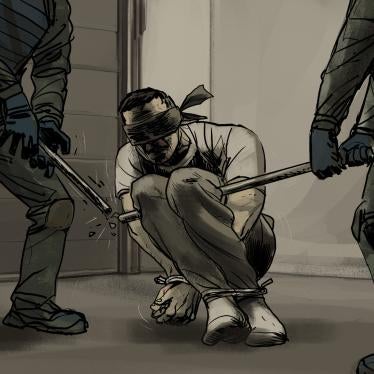(Nairobi) - The Ethiopian Federal High Court on January 19, 2012, convicted three Ethiopian journalists, an opposition leader, and a fifth person under an anti-terrorism law that violates free expression and due process rights, Human Rights Watch said today. The Ethiopian government should immediately drop the case, release the defendants, and investigate their allegations of torture in detention.
The journalists are Woubshet Taye Abebe of the now-closed weekly newspaper Awramba Times, Reeyot Alemu Gobebo of the weekly newspaper Feteh, and Elias Kifle, editor of the online Ethiopian Review, who was tried in absentia. An opposition leader, Zerihun Gebre-Egziabher Tadesse of the Ethiopian National Democratic Party, and a woman named Hirut Kifle Woldeyesus were also convicted. All five were convicted of conspiracy to commit terrorist acts, which carries a sentence of 15 years to life imprisonment or death, as well as of participating in a terrorist organization. They were also convicted of money laundering under the Ethiopian criminal code. Their sentencing is expected on January 26.
“The verdict against these five people confirms that Ethiopia’s anti-terrorism law is being used to crush independent reporting and peaceful political dissent,” said Leslie Lefkow, senior Africa researcher at Human Rights Watch, “The Ethiopian courts are complicit in this political witch-hunt.”
The case was marred by serious due process concerns. The defendants had no access to legal counsel during their three months in pretrial detention, and the court did not investigate their allegations of torture and mistreatment in detention.
Public comments by government officials have undermined the defendants’ presumption of innocence. A government spokesman, Shimeles Kemal, told Human Rights Watch in a telephone interview in September that Reeyot and Woubshet had been involved in planning terrorist acts. In October Prime Minister Meles Zenawi told the Ethiopian parliament that the authorities had conclusive evidence that the journalists and political opposition members arrested under the law were guilty of terrorism.
Both Woubshet and Zerihun alleged in court that they had been tortured, including being beaten, and mistreated during their pretrial detention at Addis Ababa’s notorious Maekelawi prison. None of the defendants were granted access to legal counsel during their pretrial detention. Local sources told Human Rights Watch that these complaints of mistreatment have not been investigated by the court.
Families and friends of the defendants have been granted visiting rights at Kaliti, where the defendants were transferred once the trial started in September 2011.
The evidence submitted by the prosecution only emphasizes the government’s political motivations behind the prosecutions, Human Rights Watch said.
According to the charge sheet, which Human Rights Watch examined, the evidence consisted primarily of online articles critical of the government and telephone discussions notably regarding peaceful protest actions that do not amount to acts of terrorism. Furthermore, the descriptions of the charges in the initial charge sheet did not contain even the basic elements of the crimes of which the defendants are accused. Two individuals attending the trial told Human Rights Watch that the prosecution put forward no evidence of involvement in terrorist acts.
“Getting a fair trial in a political case in Ethiopia today may be impossible,” Lefkow said. “The prosecution should drop the charges against these defendants and instead investigate their allegations of torture.”
Human Rights Watch has repeatedly raised serious concerns about Ethiopia’s Anti-Terrorism Proclamation of 2009, including its overly broad definition of “terrorist acts,” which can include acts of peaceful protest that result in the “disruption of any public services”. The law also includes vague provisions that proscribe support for, or encouragement of, terrorism, which can include public reporting on banned terrorist groups.
The provision on pretrial detention allows suspects to be held in custody for up to four months without charge, one of the longest periods in anti-terrorism legislation worldwide. The provision violates due process rights guaranteed under Ethiopian law and international law, Human Rights Watch said.
The ruling comes one month after two Swedish journalists were sentenced to 11 years in prison on charges of “rendering support to terrorism,” based on their having illegally entered Ethiopia to investigate and report on abuses in the Ogaden area. Since June 2011, at least two other people have been convicted under the law and 24 others have been charged, including six other journalists and three opposition party members.
“Within the space of a month five journalists and one political opposition leader have been sentenced under ludicrous provisions in Ethiopia’s anti-terrorism law,” Lefkow said. “The worst provisions in the law should be immediately amended to prevent further abuse and ensure that the law conforms to international standards.”





